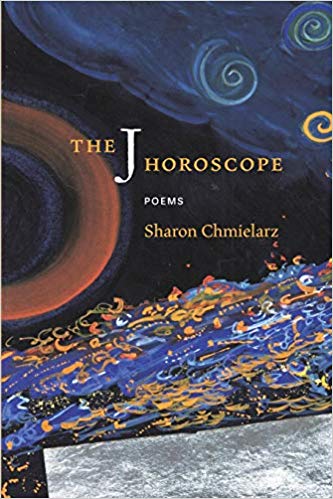| <- Back to main page |
(Brighthorse Books)

We are told, wading into the murky waters of The J Horoscope, that its author was a subject of King Solomon living around 937 BCE, and that, “Of the four writers in Genesis, J is the one who delivers the earthly creatures—Noah, Joseph, Jacob, Rachel, et al—and, to paraphrase Pogo, they is us.” But the poems that follow, while they do occasionally involve these characters and some of the narratives from Genesis (the Garden of Eden, Noah’s flood, Joseph’s exile) have much more to do with a certain contemporary Minnesota poet named Sharon Chmielarz than the Old Testament. At one point in her “reimagining” Yahweh takes the form of a stork and sits on a light pole watching the street:
The next day I deliver another baby, a bundle
of trust; yes, babies have to trust, that’s the first
unspoken contract with the world. The first forgotten.
(“Yahweh the Stork Re the Family”)
I don’t recall God appearing as a stork anywhere in the Bible—isn’t that more a Northern European pagan myth? But cultures all seem to blur into each other in The J Horoscope, as well as ages. And then we have the mysterious “Intersection” poems scattered throughout the collection, where Biblical and modern worlds seem to collide in some huge time travel experiment gone wrong:
There she was. She’d bought an apple red
BMW and drove it with gusto. Crash!
She didn’t see Him coming. Well, it was His fault,
too. They both jumped out, waving their arms.
(“Intersection #2”)
There are more cheeky moments, like a play-in-a-poem where Yahweh’s role is a parking garage attendant, and a piece called “Oh, Daddy, Daddy, Daddy Lot”. But darkness always lurks just around the corner here. Take “Yahweh the Avenger”, where a girls prays “this place used to be cool. Lots of parties. Now I think you should nuke it,” and even Yahweh seems melancholy:
Hear the violins’ tremolo over the ruins?
My chilled angels. All things once loved—
the Rhenish pitcher, the Dürer rabbit—
sometimes I remember them with sadness.
Odd and outlandish, The J Horoscope baffles as much as it intrigues—but this is nothing new in American poetry. Chmielarz’s collection is less opaque than, say, the Pisan Cantos, and the poems cohere together to form their own Salvador Dalí dreamscape. Some pieces are able to step right out of their biblical framework and stand on their own, such as the imaginative personification in “Luck Out for a Walk”:
Maybe a long afternoon. Maybe rain the challenge.
It pops an umbrella up for the underpopulation.
Maybe a place to hide. In a crowd Garbo
never wanted her face seen either
This is not the first time Chmielarz has written a book-length cycle of poems—The Other Mozart (2001) is a series about Wolfgang’s sister Nannerl. In The J Horoscope the canvas is broader—perhaps too broad, as no narrative really emerges, though “To Joseph the Dreamer, the Pretty Boy”, the longest poem and centerpiece of the collection, is a mini-epic in its own right:
Of course they want to kill you, you
own their very dreams, taking up
the whole bed as you slide in REM
time through dreams’ glades, your heavy hand
gun loaded with retribution.
But in the end it is Yahweh (is J for Jehovah?) who is the most memorable character, turning from a stork to a cook to an accountant, leaning back in a lawnchair and telling a ghost writer the Garden of Eden storyline. You may feel a bit bewildered in the land of The J Horoscope, not to mention disoriented. But you’ll never visit anyplace like this again.
- Joel Van Valin 